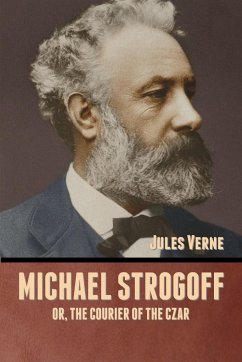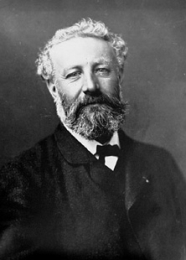Michael Strogoff: The Courier of the Czar (French: Michel Strogoff) is a novel written by Jules Verne in 1876. Critics, including Leonard S. Davidow, consider it one of Verne's best books. Davidow wrote, "Jules Verne has written no better book than this, in fact it is deservedly ranked as one of the most thrilling tales ever written." Unlike some of Verne's other novels, it is not science fiction, but a scientific phenomenon (Leidenfrost effect) is a plot device. The book was later adapted to a play, by Verne himself and Adolphe d'Ennery. Incidental music to the play was written by Alexandre Artus in 1880. The book has been adapted several times for films, television and cartoon series Michael Strogoff, a 30-year-old native of Omsk, is a courier for Tsar Alexander II of Russia. The Tartar Khan (prince), Feofar Khan, incites a rebellion and separates the Russian Far East from the mainland, severing telegraph lines. Rebels encircle Irkutsk, where the local governor, a brother of the Tsar, is making a last stand. Strogoff is sent to Irkutsk to warn the governor about the traitor Ivan Ogareff, a former colonel, who was once demoted and exiled and now seeks revenge against the imperial family. He intends to gain the governor's trust and then betray him to the Tartar hordes. On his way to Irkutsk, Strogoff meets Nadia Fedor, daughter of an exiled political prisoner, Basil Fedor, who has been granted permission to join her father at his exile in Irkutsk; the English war correspondent Harry Blount of the Daily Telegraph; and Alcide Jolivet, a Frenchman reporting for his 'cousin Madeleine'. Blount and Jolivet tend to follow the same route as Michael, separating and meeting again all the way through Siberia. He is supposed to travel under a false identity, posing as the pacific merchant Nicolas Korpanoff, but he is discovered by the Tartars when he meets his mother in their home city of Omsk. Michael, his mother and Nadia are eventually captured by the Tartar forces, along with thousands of other Russians, during the storming of a city in the Ob basin. The Tartars do not know Strogoff by sight, but Ogareff is aware of the courier's mission and when he is told that Strogoff's mother spotted her son in the crowd and called his name, but received no reply, he understands that Strogoff is among the captured and devises a scheme to force the mother to indicate him. Strogoff is indeed caught and handed over to the Tartars, and Ogareff alleges that Michael is a spy, hoping to have him put to death in some cruel way. After opening the Koran at random, Feofar decides that Michael will be blinded as punishment in the Tartar fashion, with a glowing hot blade. For several chapters the reader is led to believe that Michael was indeed blinded, but it transpires in fact that he was saved from this fate (his tears at his mother evaporated and saved his corneas) and was only pretending. Eventually, Michael and Nadia escape, and travel to Irkutsk with a friendly peasant, Nicolas Pigassof. They are recaptured by the Tartars; Nicolas witnesses Nadia being raped by a Tartar soldier and murders Nadia's assaulter. The Tartars then abandon Nadia and Michael and carry Nicolas away, reserving him for a greater punishment. Nadia and Michael later discover him buried up to his neck in the ground. They continue onwards where they are delayed by fire and the frozen river. However, they eventually reach Irkutsk, and warn the Tsar's brother in time of Ivan Ogareff. Nadia's father, who has been appointed commander of a suicide battalion and later pardoned, joins them and Michael and Nadia are married. (wikipedia.org)









